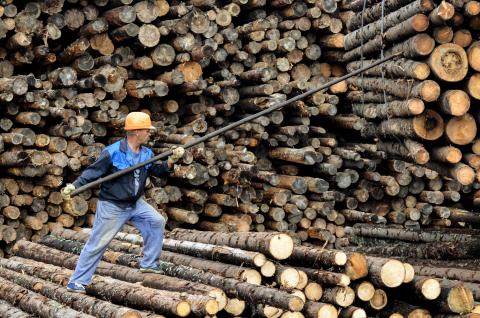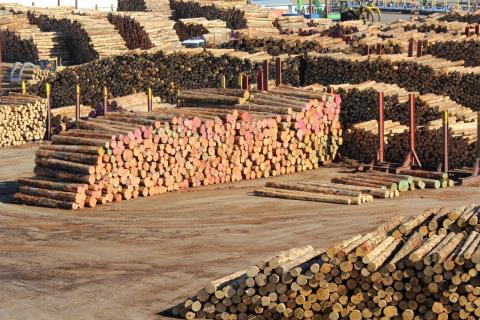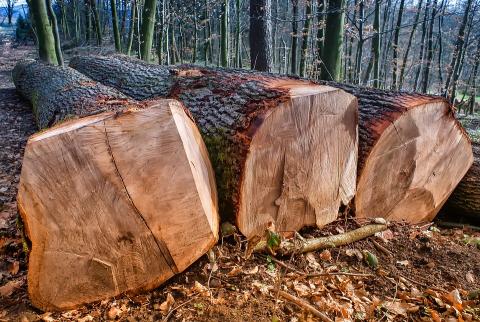Project offers free expert support to Danish companies pursuing responsible sourcing of palm oil, soy and beef
NEPCon and SEGES are now opening a case study programme that provides companies with the opportunity to identify and minimise the risks connected with sourcing palm oil, soy and beef in collaboration with experts – free of charge. Sixteen national risk assessments from some of the world’s largest producer countries of palm oil, soy and beef are now ready for Danish companies to put into use.
The risk assessments provide new and comprehensive data that can help minimise social and environmental risks right where the commodities are produced. Palm oil, soy and beef are often produced in the midst of some of the world’s most sensitive natural areas.
The global ingredient company DuPont Nutrition & Health and the Scandinavian importer of meat CARMO Food have already started the process of exploring the potential of the risk assessments in the project’s case study programme.
“We joined the project focusing on sustainable beef from Brazil and Argentina last year and right from the start it has been a very educational collaboration. With the help of NEPCon’s great expertise we have, among other things, established procurement policies in connection with our CSR strategy. Specifically, this means that we now have defined requirements for our South American suppliers, which helps us ensure that the beef we source in these locations, does not come from threatened rainforest areas,” said Jeppe Jakobsen, Purchasing Manager in CARMO Food.
“This project is a unique opportunity for us to update our ’Sustainable Soy Sourcing Policy’, try out new ways to analyse our supply chain and identify any potential problems or suppliers that we need to place under scrutiny,” stated Mikkel Thrane, Life Cycle Sustainability Manager at DuPont Nutrition & Health.
NEPCon and SEGES are looking for an additional three companies for the case study programme, who wish to make use of the free expert help offered by the project to achieve responsible import of soy, beef and palm oil. More specifically, NEPCon and SEGES are looking for:
- companies with palm oil from Indonesia, Malaysia or Ghana in their products;
- companies with soy from Brazil, Argentina, Paraguay, Bolivia or China in their products;
- companies sourcing beef from Argentina or Brazil.
“We have a unique opportunity to offer Danish companies a course of 4-6 months, in which our experts can help analysing a defined scope of a supply chain for risk and produce a concrete action plan to minimise the identified risks. It is an exciting opportunity to strengthen current sourcing policies or create and establish a new one,” said Alexandra Banks from NEPCon.
Contact
- NEPCon: Christian Sloth, Forest Legality Programme Manager, cs@nepcon.org, +45 31 58 79 81
- SEGES: Gustaf Bock, Chief Consultant, Business Development, gub@seges.dk, +45 40 30 17 57
- CARMO Food: Jeppe Jakobsen, Purchasing Manager, jj@carmofood.com, +45 25 30 14 44
- DuPont: Mikkel Thrane, Life Cycle Sustainability Manager, mikkel.thrane@dupont.com, +45 21 15 62 60
Facts about the project
- The project Responsible Sourcing of Soy, Cattle and Palm Oil is financed by DANIDA and implemented by NEPCon, and knowledge centre for agriculture SEGES.
- NEPCon (Nature Economy and People Connected) is an international non-profit organisation that builds commitment and capacity for mainstreaming sustainability.
- SEGES covers all aspects of farming and farm management under Landbrug & Fødevarer.
- Read more about the new risk assessments and why CARMO Food is involved in the project here.
- Read more about the case study programme here.
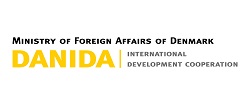
Facts on palm oil, soy and beef
- Cattle farming is responsible for approximately 14,5% of all greenhouse gas emissions according to the FAO (Food and Agriculture Organization of the United Nations).
- Cattle farming in Amazonas in Brazil is the primary cause for the felling of the rainforest. In a 20-year period (1993-2013) the number of cattle increased 200% and an area of rainforest equal to Italy was cut down.
- The production of soy feed for Danish pigs in South America annually takes up an area equal to the size of Zealand in Denmark.
- In 2013 certification schemes for soy (RTRS, ProTerra and ISCC) represented only 2-3% of the global trade of soy, according to a KPMG report ”Sustainable Insight – A Roadmap to Sustainable Soy” (2013).
- Palm oil is found in around 50% of all products sold in the supermarkets, from ready-made meals to shampoo and lipstick.
- In the last 20 years, over 3,5 million hectares of Indonesian and Malaysian forest have been cleared to make room for palm oil production.
- The Round Table of Sustainable Palm Oil (RSPO) is an internationally recognised certification scheme, whose purpose is to ensure a responsible and sustainable production of palm oil.
- Sixteen Danish companies have joined Dansk Industri Fødevares ”Erhvervsinitiativ for bæredygtig palmeolie” (Business initiative for sustainable palm oil). They aim to have all their palm oil RSPO-certified by 2018.
- Certified RSPO palm oil represents only 17% (11 m tonnes) of the global trade of palm oil.
The graph below shows the number of companies with and without commitments for different forest-related commodities from the global study done by ForestTrends' Supply Change project in 2016: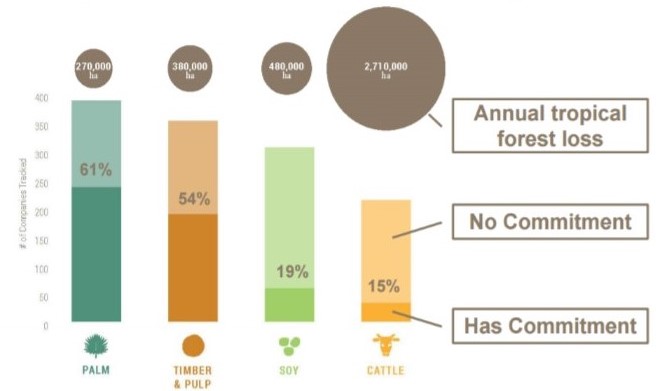
Source: McCarthy, Ben. Supply Change: Tracking Corporate Commitments to Deforestation-free Supply Chains, 2016. Washington, DC: Forest Trends, 2016.

